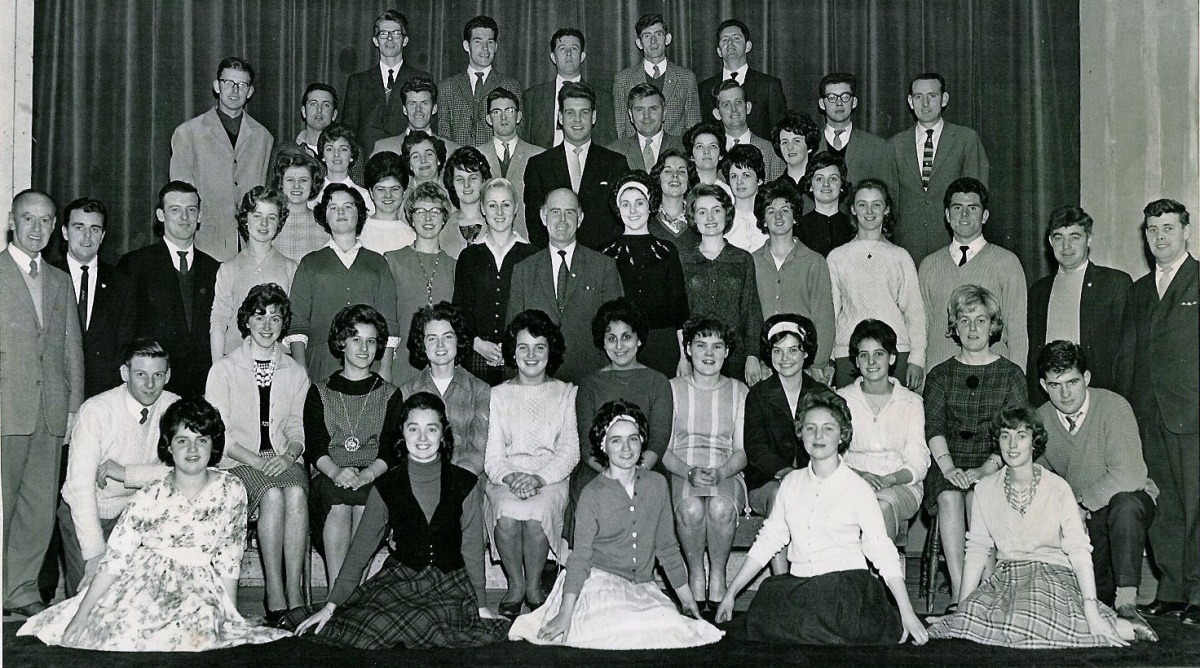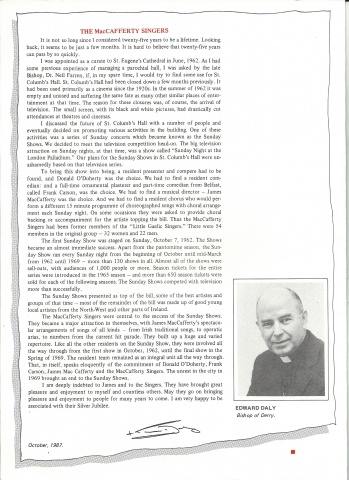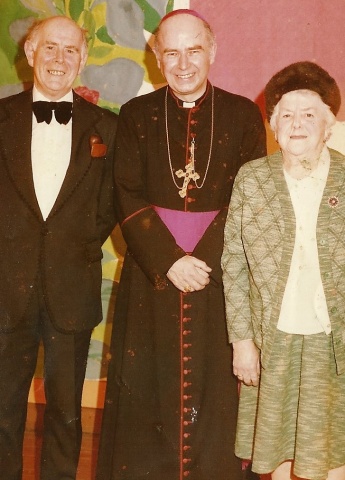
The MacCafferty Singers Original Choir, October 1962
If there is one name that is synonymous with show business in Derry in the 1960s it is that of Fr. Edward Daly who came to serve in the St. Eugene’s parish in 1962. There can be little dispute that, if he had chosen, he could easily have made a career as an impresario. He seemed to have an innate flair for show business: he had vision, imagination and was unafraid to take risks. He was happy to copy successful ideas and he was lucky, too. But one thing about him which was notable for James was that he was prepared to pay those who worked with him decent wages. Up to then James was accustomed to being asked by some parish priest or other to provide an entire concert party for ten guineas, and still hope to take home something for himself. Fr. Daly was happy to pay professional rates to professional people.
The then bishop, Dr. Farren, asked him to take over the management of St. Columb’s Hall as part of his duties. The hall had by then fallen into a rather sorry state of repair since its glory days when the main auditorium rang to the laughter of audiences at the antics of Jack Collins, John Cowley and Leo O’Donnell. This legendary trio featured in the shows and pantomimes of the forties and early fifties that are even still fondly talked about in the town. However, since then the main hall had been used chiefly as a cinema. Of course, other rooms in this large building were still being used by St. Columb’s T.A. Band, for example, and the billiard room, but the fabric of the place had deteriorated significantly. Bishop Farren hoped Fr. Daly might be able to arrest this and bring it back into general use.
James was one of the first people whose advice was sought on how to revive the fortunes of the hall, and it was decided to stage a series of variety shows on Sunday nights. James agreed to take the position of musical director who would accompany performers, direct the orchestra and provide the choral group. Don O’Doherty was to compere the shows and Frank Carson was engaged as the resident comedian.
Bishop Daly: James had a choir and he put the idea to them and everyone was enthusiastic. So we had our first rehearsal of the group that became known as The MacCafferty Singers on a Monday night in mid September 1962.
The choir in question was The Colmcille Mixed Voice Choir. It was an amalgam of The Little Gaelic Singers (many of whom were no longer so little) and The St. Eugene's Male Voice Choir, and it had competed at the Derry Feis for the first time that Easter. Indeed, it was Fr. Daly who suggested the name change as, he felt, he wanted a less parochial identity for his resident chorus. He was unashamedly influenced by a popular television show of the time which featured The George Mitchell Singers.
Pat MacCafferty, a founder member: Well, initially when we started in the Hall we had something in the region of seventy members - from every walk of life. Their one common link was James Mac Cafferty.
For the next seven years The MacCafferty Singers were an integral part of the Sunday Night Shows which in their way owed something to the television variety show Sunday Night at the Palladium. An article from The Derry Journal of the time, under the heading Slick Sunday Shows Entail Much Hard Work gives a flavour of the semi - professional regime which the shows entailed. "James MacCafferty spends an average of six hours on Monday and Tuesday of each week sifting through songs to find suitable numbers and deciding which will be harmonised, which will be better for soloists, which will suit the men or the girls or the whole choir.. Then the order is decided, harmonies are worked out and introductions are written. Finally the words are typed out for the singers in time for their rehearsal at 8 p.m. on Tuesday night. For two and a half hours they practise strenuously, learning parts arrangements and words.Later in the week another night's rehearsal strengthens and polishes what has been learnt and on Sunday afternoon from two-thirty until six p.m. the choir put music and movement together. So about 14 hours work is needed each week to produce their act."
It is little wonder that this schedule proved a bit too demanding for some members; for others the new repertoire consisting mostly of light entertainment music was too great a departure from their familiar diet of church and feis pieces. Likewise, while not all choir members were expected to take part in the choreography, that too presented one more reason to call it a day.


